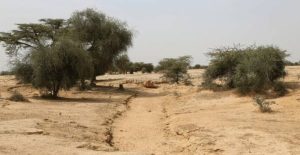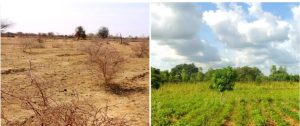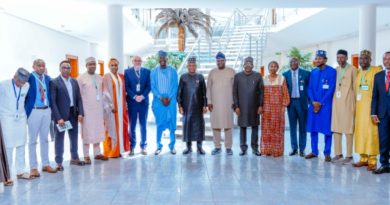Our Land, Our Future: Embracing Generation Restoration on World Environment Day 2024 and beyond.
Dr Salamatu Fada
As the world comes together to observe World Environment Day (WED) on June 5, 2024, the global theme, “Our Land, Our Future. We are #GenerationRestoration,” resonates profoundly with Nigeria. This year’s focus on restoring land, combating desertification, and enhancing resilience to drought holds particular significance for our nation, where these challenges are not just environmental issues but pivotal to our survival, economy, and heritage.
Nigeria, the most populous country in Africa, is facing an environmental crisis that threatens its land and people. Most parts of northern Nigeria have suffered severe desertification and drought. Mean annual rainfall in this region has dropped below 600mm, compared with 3,500mm in the south coast area. This change threatens the livelihoods of around 40 million people, especially livestock and smallholder farmers. Desertification is rapidly advancing, particularly in the northern regions. According to the Nigerian Environmental Study/Action Team (NEST), approximately 351,000 square kilometres of Nigerian land are impacted by desertification. This situation is exacerbated by climate change, deforestation, and unsustainable land management practices.
Desertification effects are trending down towards the Southern parts of Nigeria at a rate of 0.6 km per annum, engulfing about 351,000 ha of cropland and rangeland annually This has resulted in catastrophic consequences on food security, water availability, and livelihoods in a variety of ways. Its impacts include forced human migrations, increased erosion, alteration of geochemical composition of soils, surface and groundwater depletion, biodiversity loss and species extinction, reduced agricultural yields, higher unemployment and rural poverty rates, as well as a rise in social vices and civil conflicts (e.g., kidnapping, armed robbery, religious extremism, insurgency, land/territory grabbing, etc).
Drought further compounds these issues, with erratic rainfall patterns leading to periods of water scarcity in far Northern States. The Intergovernmental Panel on Climate Change (IPCC) has highlighted that sub-Saharan Africa, including Nigeria, will experience increased frequency and intensity of droughts.

This prediction underscores the urgent need for strategies to enhance resilience and adaptation to these climatic changes.
The theme “Our Land, Our Future. We are #GenerationRestoration” is not just a slogan; it is a call to action for every Nigerian. It underscores the responsibility of this generation to restore our degraded lands and secure a sustainable future. Restoration goes beyond planting trees; it encompasses a holistic approach to land management, integrating traditional knowledge with modern techniques.
One of the most effective ways to combat desertification and restore land is through community involvement. Local communities, especially those directly affected, have invaluable knowledge and a vested interest in protecting their environment. Traditional practices such as agroforestry, which combines agriculture with tree cultivation, have proven effective in restoring soil fertility and preventing erosion.
In northern Nigeria, the practice of “zai” or “tassa” farming involves digging small pits to capture water and nutrients, enabling crops to survive in arid conditions. Another traditional technique, “diguettes,” involves building stone lines along contours to slow water runoff and capture soil, enhancing moisture retention and reducing erosion. These methods, when supported by modern science and technology, can significantly contribute to land restoration efforts.
The Nigerian government has recognized the severity of desertification and drought and has initiated several policies and programs aimed at addressing these issues. The Great Green Wall initiative is one such program, aiming to create a green belt across the Sahel region to combat desertification. This project not only focuses on tree planting but also promotes sustainable land management practices and supports livelihoods through the creation of green jobs.
In addition to the Great Green Wall, the Nigerian government has launched the National Agency for the Great Green Wall (NAGGW) and the Desert-to-Food Programme, which seeks to transform desert areas into productive agricultural lands. These initiatives are crucial for reversing land degradation and ensuring food security.

Advancements in technology and innovation play a pivotal role in restoring degraded lands and enhancing resilience to drought. Remote sensing and geographic information systems (GIS) are being used to monitor land degradation and assess the effectiveness of restoration efforts. These tools provide valuable data that inform decision-making and enable targeted interventions.
Water management technologies, such as drip irrigation and rainwater harvesting, are critical in arid regions. These methods maximize water use efficiency, ensuring that crops receive adequate moisture even during dry periods. The promotion of drought-resistant crop varieties also holds promise, allowing farmers to maintain productivity despite challenging climatic conditions.
The private sector and non-governmental organizations (NGOs) have a crucial role to play in the restoration of Nigeria’s degraded lands. Corporate social responsibility (CSR) initiatives focused on environmental sustainability can drive significant change. Companies can invest in afforestation projects, support sustainable agriculture practices, and promote renewable energy solutions.
NGOs, both local and international, bring expertise, resources, and a grassroots approach to land restoration. Organizations such as the Nigerian Conservation Foundation (NCF) and the International Institute of Tropical Agriculture (IITA) have been instrumental in implementing projects that promote sustainable land use, biodiversity conservation, and climate resilience.
In addition, raising public awareness about the importance of land restoration and the impact of desertification is essential. Educational programs that teach sustainable land management practices should be integrated into school curriculums. Media campaigns, community workshops, and environmental clubs can also play a significant role in spreading knowledge and inspiring action.
In conclusion, as we celebrate WED 2024, let us remember that the theme “Our Land, Our Future. We are #GenerationRestoration” calls for collective responsibility. Every Nigerian, from policymakers and scientists to farmers and students, has a role to play in restoring our land and securing our future.
The challenges of desertification and drought are daunting, but they are not insurmountable. By embracing sustainable practices, harnessing technology and innovation, and fostering community involvement, we can turn the tide. Let this year’s WED be a reminder of our duty to the land that sustains us and a catalyst for transformative action.
Together, we can ensure that our land remains fertile, our waters abundant, and our future bright.
Salamatu J. Fada PhD, DSc, PGCert (Bangor University, UK), is an
Environmental professional and Chief Executive JAVS Environmental Care Ltd.




